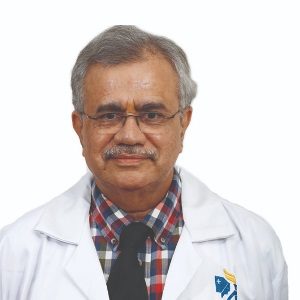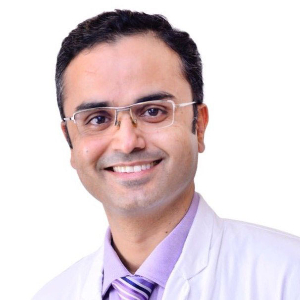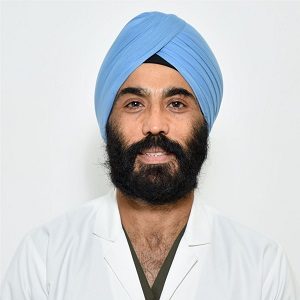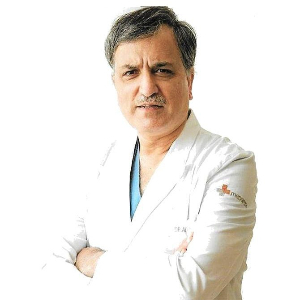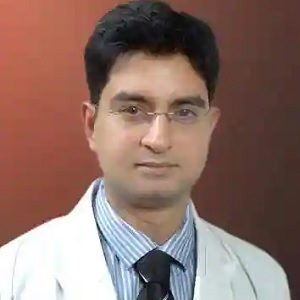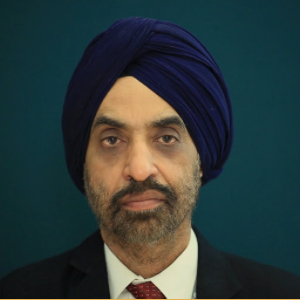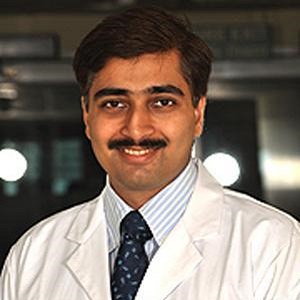Best Doctors in India for Alcoholic Hepatitis Treatment
- Pediatric Orthopedic Surgeon, Gurugram, India
- Over 24 years’ experience
- Artemis Hospital, Gurgaon
Profile Highlights:
- Dr. Sanjay Sarup is a leading Orthopedic Surgeon with over 24 years of experience during which he has been associated with the best hospitals in the country.
- He performs a number of orthopedic procedures that includes surgery for correcting Scoliosis and Kyphosis, Club foot, dislocated hips, and hip deformity since birth among several other procedures.
- Dr. Sarup received his training in orthopedic surgery from leading hospitals in India and UK and holds a Fellowship of the Royal Hospital for Sick Children, Glasgow in Pediatric Orthopedics.
- Pulmonologist, Chennai, India
- Over 36 years’ experience
- Apollo Hospitals Greams Road
Profile Highlights:
- Dr. Narasimhan R is a highly experienced and distinguished Pulmonologist, known for his pioneering contributions to the field. With over 35 years of experience, he has established himself as a leading expert in advanced respiratory procedures and treatments.
- Currently, Dr. Narasimhan heads the Department of Respiratory Medicine at Apollo Hospitals, Chennai.
- His expertise spans a range of innovative techniques, including bronchial thermoplasty for severe asthma, transbronchoscopic cryo-biopsy of the lung, and cryoablation for endobronchial lung tumors. He is also renowned for his work with endobronchial ultrasound (EBUS) to guide biopsies from difficult-to-reach nodes.
- Top Musculoskeletal Surgeon | Max Hospital, Saket, New Delhi, India
- 20+ Years Experience
- Max Super Specialty Hospital, Saket, New Delhi
Profile Highlights:
- Dr. Akshay Tiwari is a well-known Musculoskeletal Surgical Oncologist who holds an extensive experience of close to two decades and finds interest in the treatment of musculoskeletal cancer patients.
- He is trained in surgery for cancers of the bone and soft tissues and has performed more than 1000 surgeries for bone and soft tissue tumors.
- Orthopedic Surgeon, Gurugram, India
- Over 25 years’ experience
- Artemis Hospital, Gurgaon
Profile Highlights:
- Dr. I.P.S. Oberoi is a leading Orthopedic and Joint Replacement Surgeon in India with over 25 years of experience.
- He has a 97% success rate in performing more than 7000 joint replacements.
- He was the first and one of the only few surgeons to perform Key Hole Surgery (Arthroscopy) for Shoulder, Knee, Elbow, Hip, and Ankle Injuries.
- He is the youngest arthroscopy surgeon to be elected as the President of the Indian Arthroscopy Society twice.
- Dr. I.P.S. Oberoi is the first Indian to have served as secretary of the Asian Arthroscopy Congress and is the only surgeon to have been chosen secretary of the Indian Arthroscopy Society twice.
- Cardio Thoracic & Vascular Surgeon, Gurugram, India
- Over 35 years’ experience
- Medanta-The Medicity, Gurgaon
Profile Highlights:
- Dr. Anil Bhan is an excellent Cardiovascular and thoracic surgeon who has performed more than 15,000 cardiac and vascular surgeries that include heart transplant surgery, aortic aneurysm surgery, pediatric cardiac surgery, valve repairs, and peripheral vascular surgery among several others.
- He is one of the best pediatric cardiac surgeons in Delhi/ NCR and is credited with performing heart bypass surgery on the youngest patient in India in 2007 (18 months).
- He performed the first extracorporeal membrane oxygenation (ECMO) and was the first to use a harmonic scalpel for harvesting radial mammary artery conduits in India in 2000 and 1995 respectively.
- Hemato Oncologist, Gurugram, India
- Over 20 years’ experience
- Medanta-The Medicity, Gurgaon
Profile Highlights:
- Dr. Nitin Sood is a highly experienced Hematologist specializing in a wide range of blood disorders, including leukemia, lymphomas, multiple myeloma, amyloidosis, and various anemias such as thalassemia and sickle cell anemia.
- He also deals with complex conditions like bleeding and clotting disorders, as well as bone marr*w transplants.
- Currently, Dr. Nitin Sood holds the position of Director in the Department of Hemato Oncology and BMT at Medanta-The Medicity, Gurugram.
- ENT, Head & Neck Surgeon; Gurugram, India
- Over 15 years’ experience
- CK Birla Hospital Gurugram
Profile Highlights:
- Dr. Anish Gupta is currently working as a ENT specialist with over 15 years of experience at CK Birla Hospital, Gurugram.
- Dr. Anish Gupta is a distinguished ENT specialist and Head & Neck surgeon based in Gurgaon, renowned for his extensive expertise and dedication in the field.
- With a wealth of experience spanning both common and complex procedures, Dr. Gupta excels in ontological and rhinological surgeries, laryngeal framework procedures, endoscopic sinus surgery, cochlear implants, thyroidectomy, and the surgical treatment of head and neck tumors.
- Gynecologist, Gynae-Oncologist, Gurugram, India
- Over 30 years’ experience
- Medanta-The Medicity, Gurgaon
Profile Highlights:
- Dr. Sabhyata Gupta is the Chairperson of Gynaecology and Gynae-Oncology at Medanta, Gurugram, and a pioneering figure in her field.
- She is notably the first gynecologist in India to perform robotic gynaecological surgery for both cancerous and benign conditions.
- With extensive expertise in robotic surgery, gynaec oncology, colposcopy, advanced gynaec laparoscopy, and hysteroscopy, Dr. Gupta is a leader in providing cutting-edge treatments for women’s health.
- Top Cardiologist | Max Hospital, Saket, New Delhi, India
- 34+ Years Experience
- Max Super Specialty Hospital, Saket, New Delhi
Profile Highlights:
- Dr. Balbir Singh is a reputed cardiologist with over 32 years of experience, who is considered a veteran in his field, both nationally and internationally.
- He has also pioneered several minimally invasive cardiology surgical techniques in India and has been honored with the prestigious Padma Shree Award for his exceptional performance.
- “LIMCA” Book of Records also highlighted Dr. Balbir Singh’s contribution to the medical field in the Indian Electrophysiology Journal.
- Eye Surgeon, Ophthalmologist, Gurugram, India
- Over 15 years’ experience
- Artemis Hospital, Gurgaon
Profile Highlights:
- Dr. Sameer Kaushal is an experienced Ophthalmologist specializing in both cornea and cataract treatments. Currently serving as the Head of Ophthalmology and Organ Transplant at Artemis Hospitals in Gurugram, Dr. Kaushal brings extensive expertise and dedication to his role.
- Dr. Kaushal is known for his advanced techniques in eye surgery, including sutureless corneal transplants and artificial corneas. His clinical focus encompasses a wide range of eye conditions, from corneal disorders and ocular surface issues to refractive surgeries like LASIK and cataract treatments.
- He is also adept at handling pediatric ocular disorders, including pediatric cataracts.
Best Hospitals in India for Alcoholic Hepatitis Treatment
ALCOHOLIC HEPATITIS
Alcoholic hepatitis is a liver infection, which is mainly caused by frequent, heavy use of alcohol. Fat can build up in the liver cells, which might lead to inflammation as well as scarring of the liver.
Alcoholic hepatitis might be mild or severe. A patient might even need a liver transplant if proper treatment is not provided, or if they don’t stop consumption of alcohol.
It is also notable that all heavy drinkers don’t develop this condition, and sometimes this condition even develops in people who drink moderately. However, if you are diagnosed with this condition, it is important for you to quit drinking alcohol. People who continue drinking alcohol might face a huge risk of serious liver damage as well as death.
Symptoms
Depending on the amount of damage to the liver, the symptoms can vary. If you are having a mild form of the disease, you might not even experience any symptoms at all. However, as the damage continues to grow, you might experience the following:
- Changes in appetite
- Dry mouth
- Weight loss
- Pain or swelling in the abdomen
- Jaundice, or yellowing of the skin or eyes
- Fever
- Nausea and vomiting
- Easy bleeding or bruising
- Changes in your mental state, including confusion
- Fatigue
The symptoms of this condition are similar to those caused by a few other health conditions. Therefore, if you develop any of these symptoms, it is best to get a proper diagnosis as well as begin treatment.
Causes & risk factors
Alcoholic hepatitis generally develops when the alcohol you drink causes damage to your liver. However, it is not clear why alcohol does this damages only to some heavy drinkers.
Few factors that are known to play a role in this condition include:
- The body’s process that breaks down alcohol produces some toxic chemicals
- These chemicals can trigger inflammation that can destroy the liver cells
- Thus, over time, scars replace healthy liver tissue, thus interfering with the function of the liver
- This irreversible scarring, which is also termed cirrhosis, is the final stage of alcoholic liver disease
If you have hepatitis C and continue to drink, even moderately, you are more likely to develop cirrhosis.
Some heavy drinkers are also malnourished because they don’t eat a proper balanced diet. Alcohol and its byproducts also prevent the body from absorbing nutrition properly. Lack of nutrition can contribute to liver cell damage.
Some other risk factors that can lead to this condition include:
- Your sex- Women are usually at a higher risk of developing alcoholic hepatitis since the way alcohol is processed in women is different.
- Binge drinking- Having over five drinks within two hours for men and four or more for women can increase the risk of alcoholic hepatitis.
- Obesity- Heavy drinkers who are overweight are also more likely to develop alcoholic hepatitis and to progress from that condition to cirrhosis.
- Race and ethnicity- Hispanic and Negroid people might be at higher risk of alcoholic hepatitis.
- Genetic factors- According to studies, there may be a genetic component in alcohol-induced liver disease. However, it is difficult to separate genetic and environmental factors.
Diagnosis
If you are showing symptoms of alcoholic hepatitis, your doctor will first inquire about your medical history and alcohol consumption. Next, he/she will perform a physical exam to see if you have an enlarged liver or spleen. They might also need a few more tests to confirm your diagnosis, such as:
- Complete blood count (CBC)
- Liver function test
- Ultrasound of the liver
- Abdominal CT scan
- Blood clotting tests
In some cases, a liver biopsy might also be needed to confirm the diagnosis of alcoholic hepatitis. A liver biopsy requires your doctor to remove a tissue sample from your liver, which is then tested in the lab. This method helps to show the severity and type of liver disease.
Treatment
Stopping alcohol consumption is the most important treatment for alcoholic hepatitis. There is no cure for this condition, but treatment can help in reducing or eliminating symptoms, or stopping its progression.
It is also important to note that scarring of the liver is permanent, but treatment can aim to restore as much function as possible.
Dietary changes
Medication
Liver transplant
The best hope of recovery is to be aware of the signs and symptoms as well as to reduce, manage, or if possible, completely stop consumption of alcohol.
Complications
Alcoholic hepatitis might lead to severe other complications such as:
- Enlarged veins (varices)- In this condition, blood that is unable to flow freely through the portal vein, can back up into other blood vessels in your esophagus or stomach.
- Hepatic encephalopathy- This condition can be caused by the buildup of toxins if your damaged liver is unable to remove all the toxins from your body. It involves confusion, drowsiness, and slurred speech.
- Ascites- Ascites is a condition in which the fluid that accumulates in the abdomen may get infected and thus, require treatment with antibiotics. Although this condition is not life-threatening, it can be a sign of advanced alcoholic hepatitis, or cirrhosis.
- Kidney failure- A damaged liver affects blood flow to the kidneys, thus resulting in kidney failure.
- Cirrhosis- The scarring of the liver might lead to liver failure.
Prevention
Alcoholic hepatitis might be prevented if you take the following steps:
- Drink alcohol in moderation, if at all- For healthy adults, moderate drinking means no more than one drink a day for women of all ages and men older than 65, and not over two drinks a day for men aged 65 and younger. However, if you prevent all alcohol, it is a certain way to prevent this condition.
- Check before mixing medications and alcohol- Ask your doctor if it’s safe to drink alcohol while you are taking medications. Consider reading the warning labels on over-the-counter medications as well. Don’t drink alcohol when you are taking medications that warn of complications when combined with alcohol.
- Protect yourself from hepatitis C- Hepatitis C is an infectious liver disease that is caused by a virus. If it is left untreated, it may lead to cirrhosis. If you are having hepatitis C and you consume alcohol, you’re generally more likely to develop cirrhosis than if you don’t drink.


